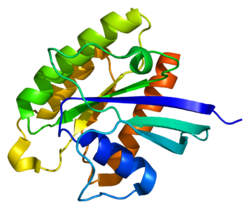
A large-scale study led by researchers at Columbia and Brigham and Women’s Hospital/Harvard is the first to establish that a diet low in flavanols—nutrients found in certain fruits and vegetables—drives age-related memory loss.
The study found that flavanol intake among older adults tracks with scores on tests designed to detect memory loss due to normal aging and that replenishing these bioactive dietary components in mildly flavanol-deficient adults over age 60 improves performance on these tests.
“The improvement among study participants with low-flavanol diets was substantial and raises the possibility of using flavanol-rich diets or supplements to improve cognitive function in older adults,” says Adam Brickman, Ph.D...
Read More






 Images: 1. RHEB, Ras homolog enriched in brain 2. BACE1
Images: 1. RHEB, Ras homolog enriched in brain 2. BACE1

Recent Comments